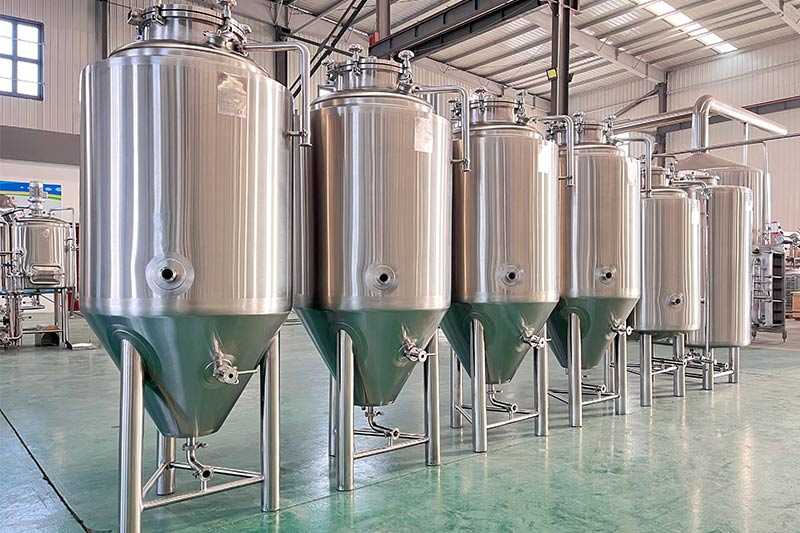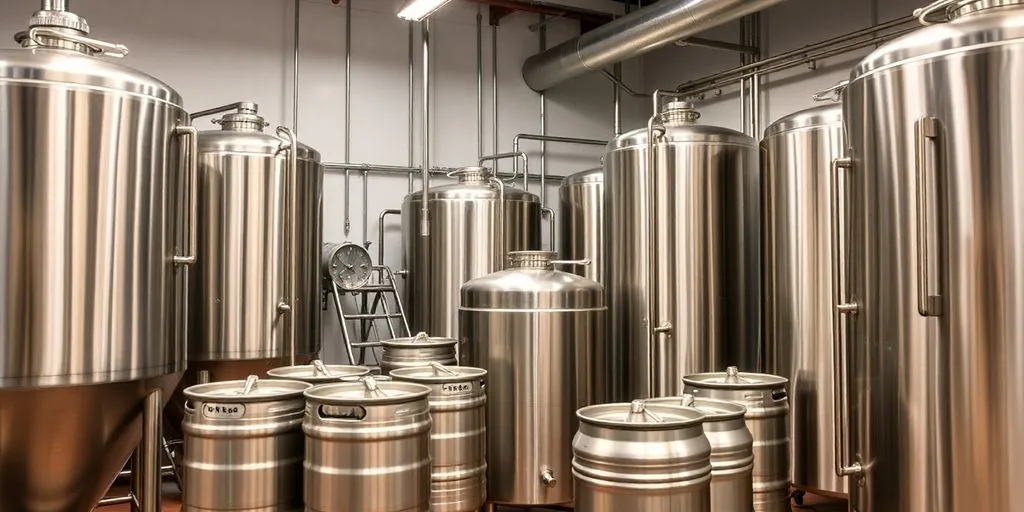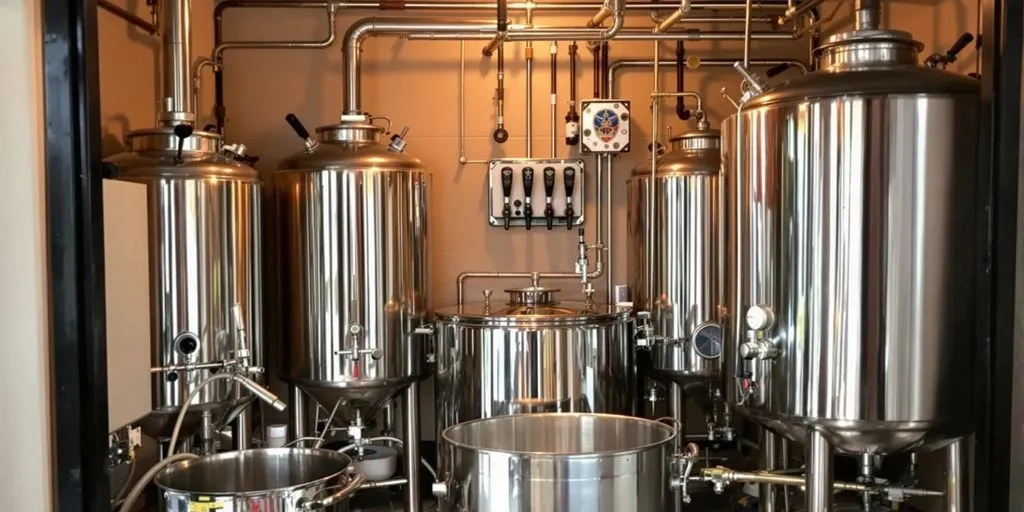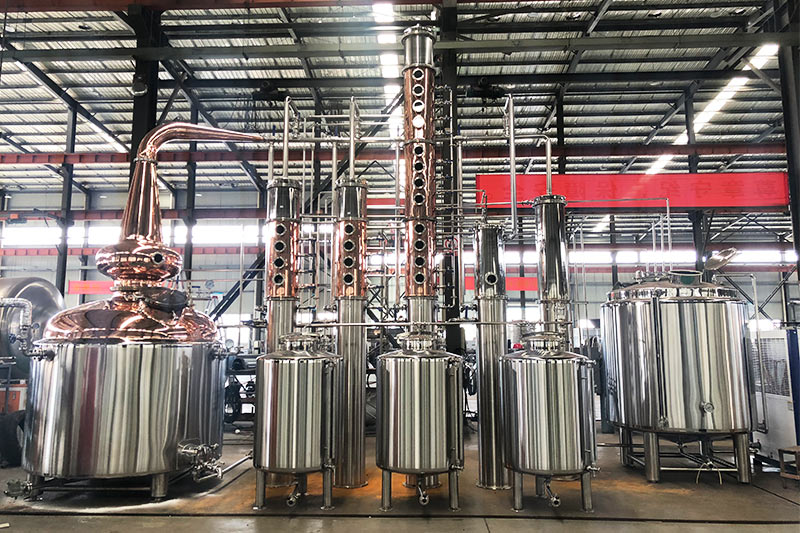Crafting the perfect brew is both an art and a science. For craft brewers looking to produce high-quality beer, investing in the right brewing equipment is essential. This comprehensive guide explores the world of craft brewery equipment, offering insights into how it can enhance your brewing process. Whether you’re a seasoned brewer or just starting, this article will provide valuable information to help you make informed decisions.

Table of Contents
What Is Craft Brewing Equipment and Why Is It Essential?
Craft brewing equipment refers to the specialized tools and machinery used in the brewery for beer brewing. This includes everything from the brewhouse to the fermenter and keg. Investing in high-quality brewing equipment is the simplest way to brew the best beer.
Essential Components
- Brewhouse: The central hub where the mash is prepared and boiled.
- Fermenters: Vessels where yeast converts sugars into alcohol.
- Kettles: Used for boiling and brewing the beer.
- Tanks: For storage and conditioning.
Having the right equipment makes it easy for craft brewers to control every aspect of the brewing process, ensuring a consistent and quality beer.
How to Choose the Right Brewing Equipment for Your Brewery
Selecting the right brewery equipment depends on various factors, including your production capacity and the types of beer you want to brew.
Factors to Consider
- Capacity: Determine how much beer you plan to produce.
- Space: Assess the available space in your brewery for equipment.
- Budget: High-quality equipment is an investment but offers long-term benefits.
- Customization: Equipment should fit your needs and allow for future expansion.
For tailored solutions, Commercial Brewery Equipment offers options designed to scale with your brewery.
The Importance of Stainless Steel in Brewing Systems
Stainless steel is the material of choice for most brewing equipment due to its durability and cleanliness.
Benefits of Stainless Steel
- Hygiene: Easy to clean and sterilize, preventing contamination.
- Durability: Resistant to corrosion and can withstand high temperatures.
- Taste Neutral: Does not impart any flavor to the beer.
Using 304 stainless steel ensures that the equipment lasts longer and maintains the quality of the brew.
Understanding Brewhouses: The Heart of Your Brewery
The brewhouse is where the magic begins. It’s the center of the beer brewing process.
Components of a Brewhouse
- Mash Tun: Where grains are soaked to extract sugars.
- Lauter Tun: Separates the sweet wort from the grain husks.
- Brew Kettle: Boils the wort with hops and other ingredients.
Different configurations like 3 Vessel Brewhouse offer flexibility and efficiency in the brewing process.
From Mash to Keg: The Beer Brewing Process Explained
Understanding the brewing process is essential for producing quality beer.
Steps in Brewing
- Mashing: Mixing crushed grains with water to extract sugars.
- Boiling: Boiling the wort with hops for flavor.
- Fermentation: Yeast converts sugars into alcohol in fermenters.
- Conditioning: Beer matures and develops flavor.
- Packaging: Transferring beer to kegs or bottles.
Each step requires specific brewing equipment designed to optimize the process.
Should You Consider Electric Brewing Systems?
Electric brewing systems are becoming popular due to their efficiency and control.
Advantages of Electric Brewing
- Precision: Accurate temperature control for consistent results.
- Efficiency: Faster heating times.
- Safety: Eliminates the need for open flames.
For small to medium-scale breweries, an electric brewing system can be a cost-effective solution.
What Role Do Tanks and Vessels Play in Beer Brewing?
Tanks and vessels are crucial for fermentation, storage, and conditioning.
Types of Tanks
- Fermentation Tanks: Where the beer ferments.
- Brite Tanks: Used for carbonation and clarification.
- Storage Tanks: Holds beer before packaging.
High-quality Beer Fermentation Tanks ensure the brew maintains its intended flavor profile.
Scaling Up: Transitioning from Home Brew to Commercial Brewing
Moving from home brew to a commercial brewing operation is a significant step.
Considerations for Scaling Up
- Equipment Upgrade: Investing in larger capacity equipment.
- Regulations: Complying with local laws and obtaining licenses.
- Quality Control: Implementing standards to maintain beer quality.
Our Microbrewery Equipment is designed to help brewers scale up efficiently.

Craft Brewers’ Guide to Brite Tanks and Fermentation
Understanding fermentation and the use of brite tanks is essential for craft brewers.
Fermentation Process
- Primary Fermentation: Yeast converts sugars into alcohol and CO₂.
- Secondary Fermentation: Beer matures and flavors develop.
Brite Tanks
- Used for aging, clarification, and carbonation.
- Essential for producing quality beer with a clear appearance.
Explore our Brite Tanks for high-quality beer conditioning.
How High-Quality Brewing Equipment Enhances Beer Quality
Investing in high-quality brewing equipment directly impacts the final product.
Benefits
- Consistency: Achieve the same taste in every batch.
- Efficiency: Reduce waste and save on costs.
- Scalability: Equipment can grow with your business.
Using equipment from trusted manufacturers ensures you brew the best beer possible.
FAQs About Craft Brewery Equipment
Investing in professional brewing equipment is the simplest way to brew the best beer. It provides control over the brewing process and ensures consistency.
Stainless steel is durable, easy to clean, and doesn’t affect the beer’s taste, making it ideal for brewing equipment.
Yes, starting with nano-brewery equipment allows you to begin on a smaller scale and expand as your business grows.
A fermenter is used for fermentation, where yeast converts sugars into alcohol. A brite tank is used after fermentation for aging, clarification, and carbonation.
Yes, we provide brewery design tailored to your specific needs, ensuring the equipment and layout fit your production goals.
Conclusion
Choosing the right craft brewery equipment is pivotal for any brewer aiming to produce exceptional beer. From the brewhouse to fermentation tanks, each piece plays a vital role in the brewing process. Investing in high-quality, 304 stainless steel equipment not only enhances the quality of your beer but also improves efficiency and scalability. As a manufacturing plant specializing in brewing equipment, we are committed to providing solutions that fit your needs and help you brew with confidence. Let’s embark on this brewing journey together and craft beers that delight and inspire.

Key Takeaways
- Invest in Quality: High-quality brewing equipment is essential for producing consistent, quality beer.
- Understand the Process: Knowing each stage of brewing helps in selecting the right equipment.
- Material Matters: Stainless steel equipment offers durability and hygiene.
- Scale Appropriately: Choose equipment that fits your current needs but allows for future growth.
- Seek Expert Advice: Partner with experienced manufacturers for equipment and brewery design.
Explore More:
- Nano Brewery Equipment – Perfect for startups looking to enter the brewing industry.
- Beer Brewing Equipment – Comprehensive solutions for all your brewing needs.
- Conical Fermenters – Enhance fermentation with our high-quality fermenters.
- Distillery Equipment – Explore equipment for spirits and other liquors.
- Keg Filling Machine – Efficiently package your beer for distribution.
Ready to take your brewing to the next level? Contact us today to discuss how our manufacturing plant can provide the perfect brewing equipment for your craft brewery.

